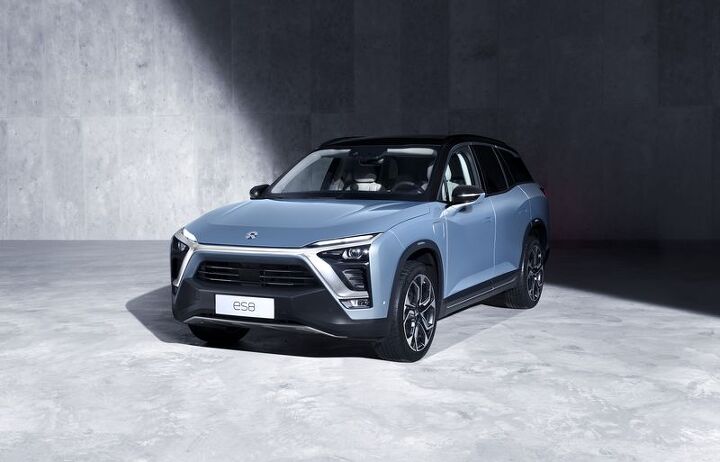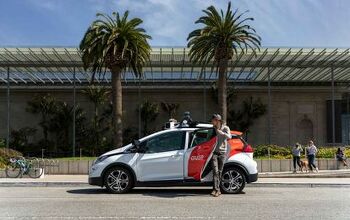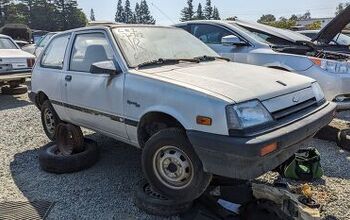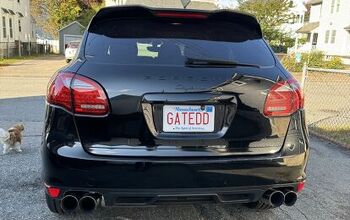Chinese Startup NIO Wants to Sell Global Crossover With Adorable A.I. Over the Phone

Nio, the Chinese electric vehicle startup that uses swappable batteries and implements a full-time digital assistant, wants to launch a global model that would make its way to the United States by 2020. To do it, it needs an alternative to the traditional dealer network most brands rely upon. Fortunately for Nio, it already has an app that allows for direct sales in China.
However, that doesn’t mean Americans would be comfortable with purchasing a car over the phone. Nor does it guarantee the United States would eagerly adopt the kind of vehicles Nio is building. For the most part, the North American market isn’t hugely enamored with electric vehicles, and the portions that are interested seem fiercely loyal to a specific Californian brand named after a Serbian-American inventor.
Padmasree Warrior, Nio’s incredibly-named U.S. CEO, says the brand’s biggest strength is the ability to offer something different. In addition to a cutesy AI system that lives within its cars’ dashboard, it also utilizes batteries that can be charged in a traditional manner or swapped out at will.
The process is slightly more arduous than replacing the power cell in your remote control, but it’s a novel and refreshing concept. It also eliminates the extended charging times typically associated with electric vehicles. We’re not convinced it’s entirely practical.
Nio is already selling cars by phone in China. According to Automotive News, Warrior said its first vehicle (the ES8 crossover) has sold all 10,000 of the initial Founders Edition vehicles through a nonrefundable 50,000 yuan ($7,900 USD) payment.
“This is where we are very, very different from other companies,” Warrior said last at the Beijing auto show, where Nio announced the six- and seven-seat versions of the ES8. “It’s really changing the paradigm of having to go to a physical dealership.”
The Founders Edition ES8 costs $86,880, but the automaker is currently finishing development on a base model with an estimated MSRP of roughly $68,000. Its 70 kWh battery pack is rumored to have a range of 220 miles. Electric motors are said to develop 644 peak horsepower, good enough for a 0-60 time of 4.4 seconds.
It sounds like the type of vehicle a lot of high-end manufacturers are trying to put out right now. But Nio’s digital assistant, named Nomi, really sets its vehicles apart from literally anything else on the road. The brand is pitching her like Apple’s Siri or Amazon’s Alexa, but with an incredibly cutesy bent and more features that tie in directly with the vehicle functions.
There is definitely a subset of the population that would eat this up. But marketing it in the U.S. could be difficult without dealerships. Warrior said Nio is still trying to figure out how to utilize the same retail concept it has in China, as it prefers its customers doing their shopping online.
“You can do a lot more through the mobile Internet,” she said. “So why not?”
While the notion of using a phone to purchase a car sounds a little weird, it’s not all that bizarre in practice. You’ve always been able to order a car by phone, provided you meet someone face to face to finalize the paperwork. You can also buy a car online from most manufacturers, even though most will try to push you into a dealership before any final decisions are made.
Tesla, America’s favorite source for tech-focused EVs, allows you do just about everything via the internet. Afterward, all you really need to do is head to a delivery center and sign your name before picking up your new vehicle. Considering that Nio would probably draw heavily from the same customer demographic, we don’t see its app-based approach having trouble catching on.
If we’re skeptical of anything it’s Nio’s timetable and tech. Swappable batteries sound like such a good idea on the surface, but a 70 kWh battery pack would weigh over 900 pounds. The automaker’s solution to this is to begin construction on 1,100 stations in China that could swap the cells in about 3 minutes. These centers should finish contsruction by 2020, but we haven’t heard anything about them being built anywhere else on the globe.
Nomi also poses a bit of a problem. She looks and sounds adorable, with a bundle of features people would probably be into. But she’s not that much different from Siri and Alexa, both of which are known quantities and are already making appearances in newer model autos. If Nio wants to keep it’s own digital assistant, it would have to adapt her for various markets and go head-to-head with the big girls that are already integrated into customers homes and phones.
The timeline is perhaps the most unrealistic element here. The Chinese brand is just now starting to produce vehicles within its home country. Chinese automakers are frequently eager to ship product into America, but delivering on it has proven troublesome. We don’t think 2020 gives Nio ample time to prepare, but we’d be happy to be proven wrong — if only to satisfy our curiosity over how it would all be handled.
[Images: Nio]

A staunch consumer advocate tracking industry trends and regulation. Before joining TTAC, Matt spent a decade working for marketing and research firms based in NYC. Clients included several of the world’s largest automakers, global tire brands, and aftermarket part suppliers. Dissatisfied with the corporate world and resentful of having to wear suits everyday, he pivoted to writing about cars. Since then, that man has become an ardent supporter of the right-to-repair movement, been interviewed on the auto industry by national radio broadcasts, driven more rental cars than anyone ever should, participated in amateur rallying events, and received the requisite minimum training as sanctioned by the SCCA. Handy with a wrench, Matt grew up surrounded by Detroit auto workers and managed to get a pizza delivery job before he was legally eligible. He later found himself driving box trucks through Manhattan, guaranteeing future sympathy for actual truckers. He continues to conduct research pertaining to the automotive sector as an independent contractor and has since moved back to his native Michigan, closer to where the cars are born. A contrarian, Matt claims to prefer understeer — stating that front and all-wheel drive vehicles cater best to his driving style.
More by Matt Posky
Latest Car Reviews
Read moreLatest Product Reviews
Read moreRecent Comments
- ToolGuy TG likes price reductions.
- ToolGuy I could go for a Mustang with a Subaru powertrain. (Maybe some additional ground clearance.)
- ToolGuy Does Tim Healey care about TTAC? 😉
- ToolGuy I am slashing my food budget by 1%.
- ToolGuy TG grows skeptical about his government protecting him from bad decisions.





































Comments
Join the conversation
If battery swap was a doable concept Tesla would already implemented it.
"Warrior said its first vehicle (the ES8 crossover) has sold all 10,000 of the initial Founders Edition vehicles through a nonrefundable 50,000 yuan ($7,900 USD) payment." I'm confused by this statement. "Sold," or "delivered"? Because it sounds like that company just made 79 million dollars without doing anything but making promises. Someone's sure to have a nice parachute built in when the company offices empty out one night.